OK, Google! Please write an article for the cognitiveSEO blog that will bring millions of readers and shares. As I got no luck with Google Assistant, I’ve tried the same thing with Siri, Cortana, just that this time I’ve been more polite. I said “please”. Still no luck. This being said, after a few more attempts I reconciled with the idea that I have to document and write on the “voice search revolution” myself.

And as I dug deeper into the “voice search SEO” area I started to ask myself whether “revolution” is the suitable word for this discussion. Don’t get me wrong, I am totally impressed by the voice search engineering and the level of innovation it brings. However, is it the case that we should all just forget everything we know about digital marketing and SEO and start re-inventing ourselves from a “voice search” point of view? For the moment, is it really a “voice search optimization” needed, as most of the industry articles suggest? Is personal assistant search optimization (PASO) the future of SEO or will the future of search change? As a content marketer and not only, you should know the answers to these questions.

We knew that there is was no other way of figuring this out than through research and observation. This being said nonetheless, we rolled up our sleeves and, started looking deep into the voice search industry; and these are the matters we’ve strived to find an answer for:
- How Many Searches Are Made on Voice Only?
- Are We Facing a Voice Search Explosion?
- Is Voice Search Any Different From Text Search?
- Do I Need to Start Optimizing for Voice Search?
- What Is Voice Search Really Used For?
- Is Voice Search the Same with Voice Command or Voice over IP?
- Who Are the Main Players from the Voice Search Industry?
- Conclusion
How Many Searches Are Really Made on Voice Only?
First thing first, when looking at the voice search SEO area, although you may already have this info, it’s important to know how does the search engine market share looks like. As expected and as you can see in the screenshot below, Google holds the supremacy with more than 70%, followed by Bing and Baidu, which together sum up around 20% . So, only 10% of the total market share is disputed by other dozens of search engines.
As much as we’d like to disagree with the famous, “the winner takes it all”, this time we’ll take it into consideration and we’re going to see how voice search is looking like for Google, Bing and Baidu.
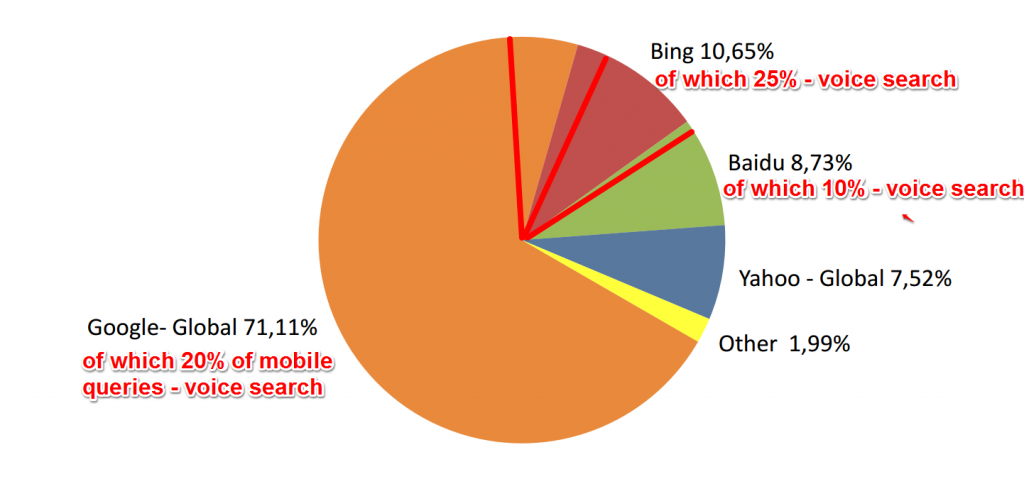
-
- Bing says 25% of ALL searches are voice searches. This is indeed notable, but let’s not forget that three of the world’s top voice assistants are powered by Bing: Apple’s Siri, Microsoft’s Cortana, and Amazon’s Alexa. Therefore, let’s keep this in mind while reading this statistic.
-
- When it comes to Baidu we found a relevant statistic only from 2 years ago. Yet, from that stat we’ve learned that about 10% of all searches are done using voice. It’s important to notice that the same Internet Trends 2016 report is suggesting that Baidu voice search is on the rise, therefore the percentage of voice search might be considerable higher. These make a lot of sense considering that typing Chinese on a small cellphone keyboard is even more difficult than typing English due to the time it takes to type with the massive Mandarin alphabet.
Are We Facing a Voice Search Explosion?
Andrew Nag, Chief Scientist at Baidu, was quoted in a the KPCB study on internet trends; the reason we are mentioning this is due to the prediction made by him, that was pretty bold: “ at least 50% of all searches are going to be through 2 types of search: images or speech”.
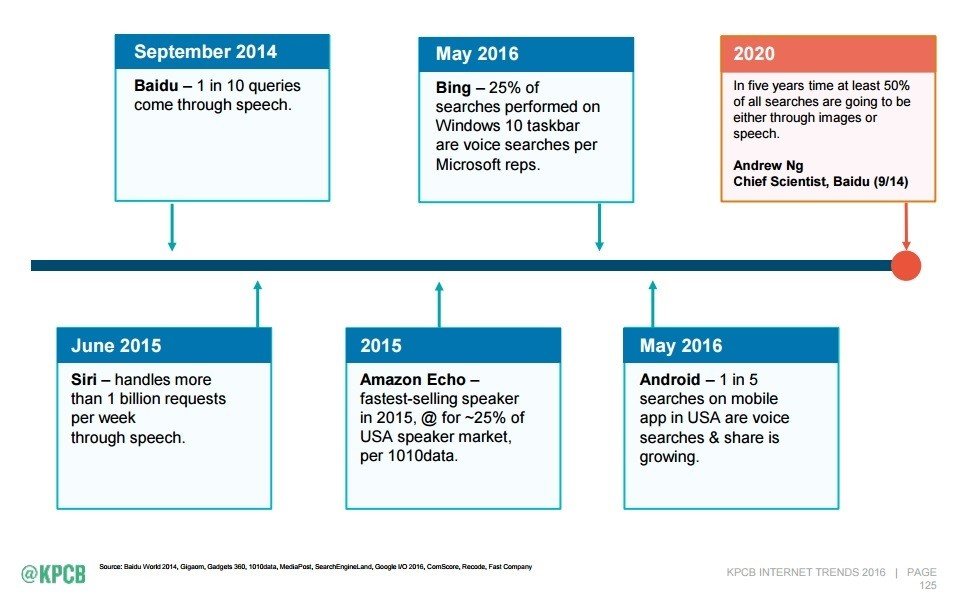
Yet, before bringing pros or cons on this statement, let’s take a look at some voice search query stats.
Looking at the charts above, we cannot deny a substantial growth of voice searchers (people using voice assistants). However, several matters should be taken into consideration when looking at the chart below:
-
- Voice search may naturally be facing a growth, yet this doesn’t mean that desktop searches are dead. It’s very likely that the total volume of search will increase overall.
- From 2013 until 2015 the voice search technology has evolved a lot, determining the user to use voice search. This might be the cause but also the fact that most of the voice search apps or devices come preinstalled on the users’ smartphones.
- Voice Assistants don’t automatically mean voice search. We have a dedicated chapter where we’ve highlighted the idea that Voice Search is different from voice commands.
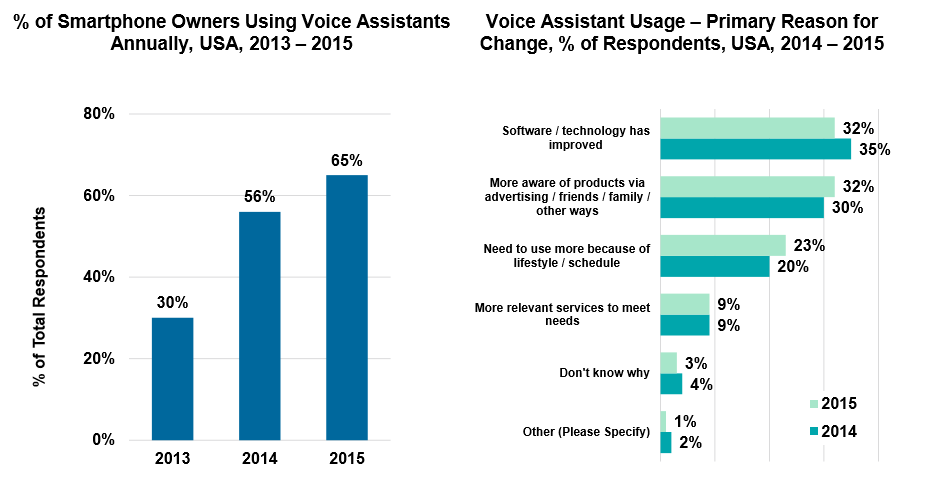
A fast and quick way to see weather voice search has really been “exploding” lately is to look at some highly used voice search terms. Let’s take for instance “near me” and “show me”, two terms that are highly used in voice search and local SEO. When looking for a gym center for instance, when typing a search, most users will type their field of interest (gym center/ fitness class/ restaurants/market, etc.) followed by the name of the city, neighborhood or the street we are interested in finding, let’s say, a fitness club.
On voice search things are slightly different in the way that is unlikely to “tell” to your voice assistant things he already knows, like your location. Therefore, your query will most likely be something similar to: “ show me fitness club near me”.
“Show me” and “near me” are therefore two highly used expressions when performing a voice search. When looking at the info Google Trends provides on the two mentioned terms, we notice indeed a nice growth, at least for the “near me” term. However, this growth looks like an organic, natural one given the tech era we are living in, but certainly not an explosive one.
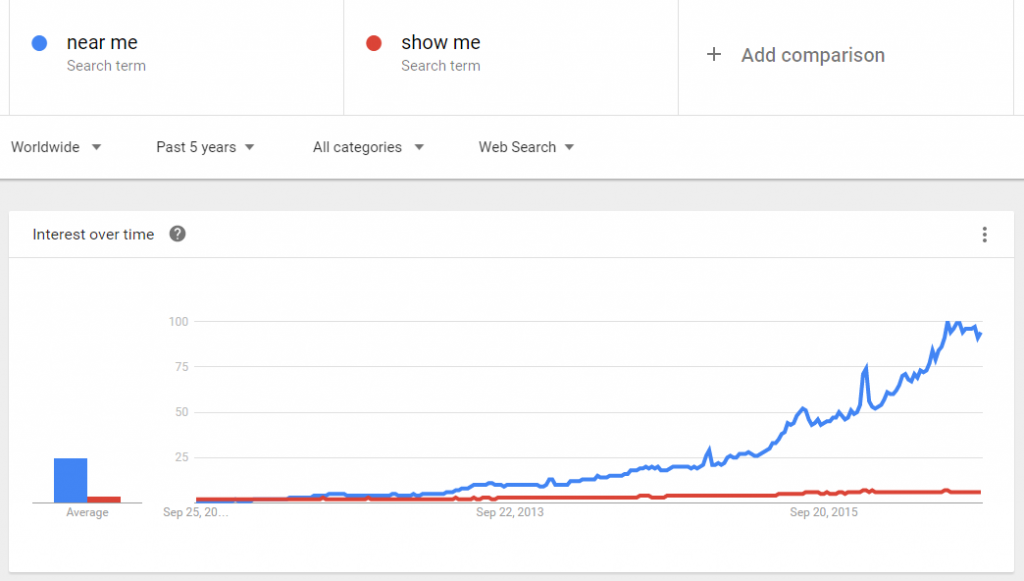
Below you can see some search terms that indeed have had some search “explosions”. It’s true that they had a decrease of interest just as fast, yet, it’s clear from the chart below that there is a difference between an organical growth and an explosive one. And the reasons we are highlighting that is because there has been a lot of stir around the idea that we need to re-imagine everything we knew about search due to the voice interaction.
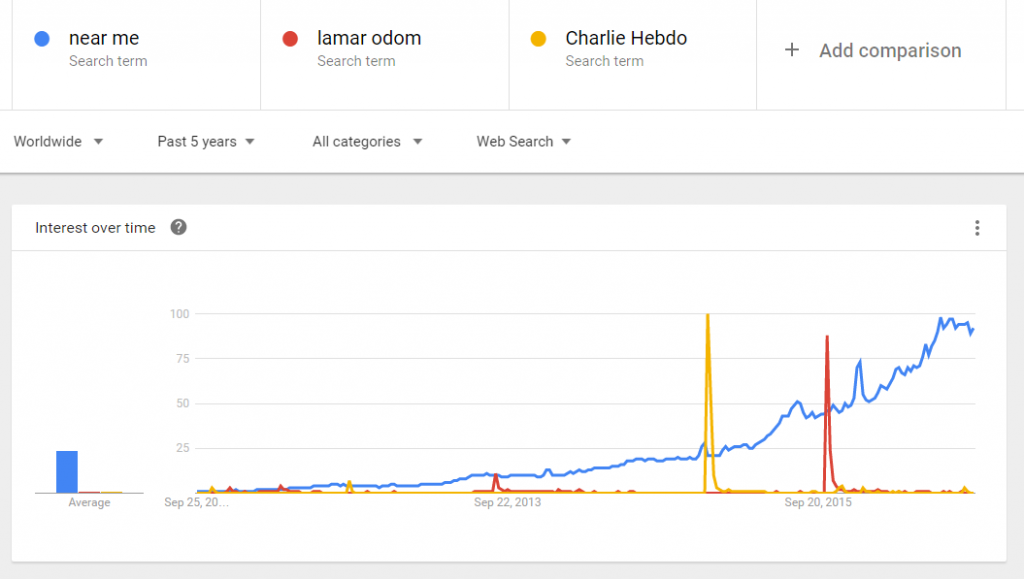
The chart below re-iterates an idea discussed in-depth below regarding what voice search is really used for. From the chart below we can see the same organica, exponential growth, but for search queries that are related with voice commands and not voice search.
Therefore, looking at the data so far, it seems that we are on the safe side and we can still use our SEO and digital marketing knowledge as the voice revolution might be close but not yet underway.
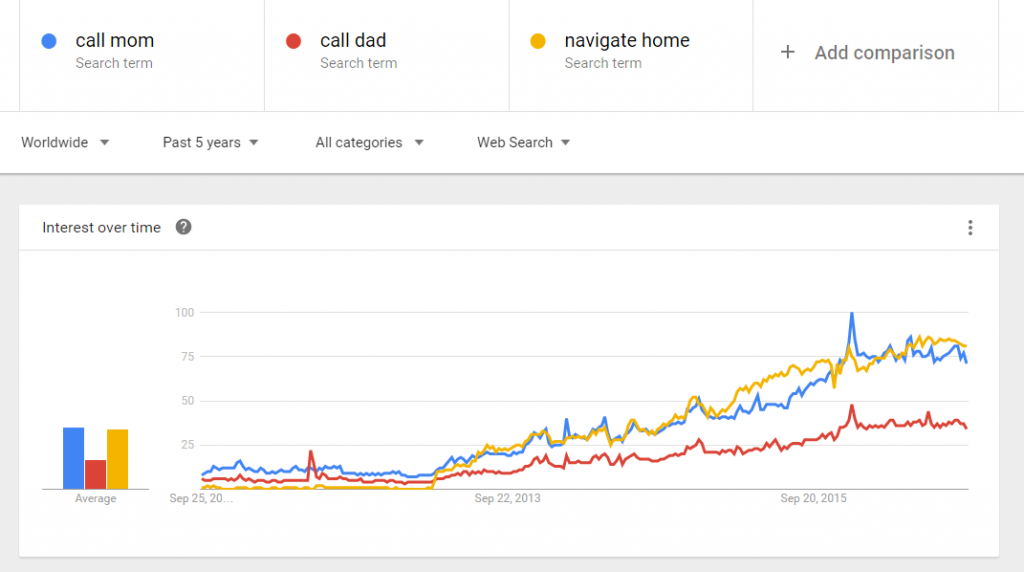
Is Voice Search Different from Keywords in a Search Box?
We’d be tempted to say that no: voice search is not different from the classic keyword typing search box. And this is why: The audio from the user’s voice is recorded and sent to the Voice Recognition APIs in order to be converted into text. Therefore, the voice search is based on text search. So there is no difference between saying or typing the query yourself.
Let’s see what happens when we search for the same query, first via text and second via voice.

Exactly; nothing happens. Results are identical.
Yet, if we are talking about the user’s interaction with the search, then the answer is slightly different. And that’s because individuals interact different through voice search than with a search box. Within search voice users tend to have a more conversational tone; they tend to reveal more about their need into a more “nuanced” way.
For instance, if interested in a fitness center, using the keyboard one might search for “fitness center Manhattan”. Yet, within conversional searches, it’s more likely that the request would sound something like: “I need to work out. Find me a gym center near me.” You can understand the user-intent.
Even so, when searching in a more conversational mode using voice, we will still get the same results as the classical “type text on the search box”.

Therefore, the same search engineering is used for both voice and text research, even if the researched queries look slightly different. John Mueller, trend analyst at Google, emphasized this a couple of months ago.
Voice search results are no different than the desktop or mobile search results interface.

Do I Need to Start Optimizing for Voice Search?
If thoughts similar to the one below ever crossed your mind, you might need to reconsider. One might think:
How can I deliver the same text based information from my web pages but with voice search?
Or
If people no longer click on an actual web page how will I manage all the decrease in search traffic?
Firstly, as mentioned above, voice search in itself is not different from the “classical” typing search in the sense that they both use the same things: text. When performing a voice search, what happens is that the spoken message is transformed into text; therefore, at the end of the day, it is still a “texted keywords” based search we are talking about.
Should you start optimizing for voice search? Depends. Should you optimize for search, in general? Definitely.
If we are talking about the “conversational” trend that the voice search is requiring, this is a different aspect. Indeed, voice searches tend to have a different style of addressing a query. Yet, search engines are highly prepared for this and not only when it comes to voice search. Google, for instance understands its users and offers them contextual results, based on their intent and not strictly on the typed keywords.
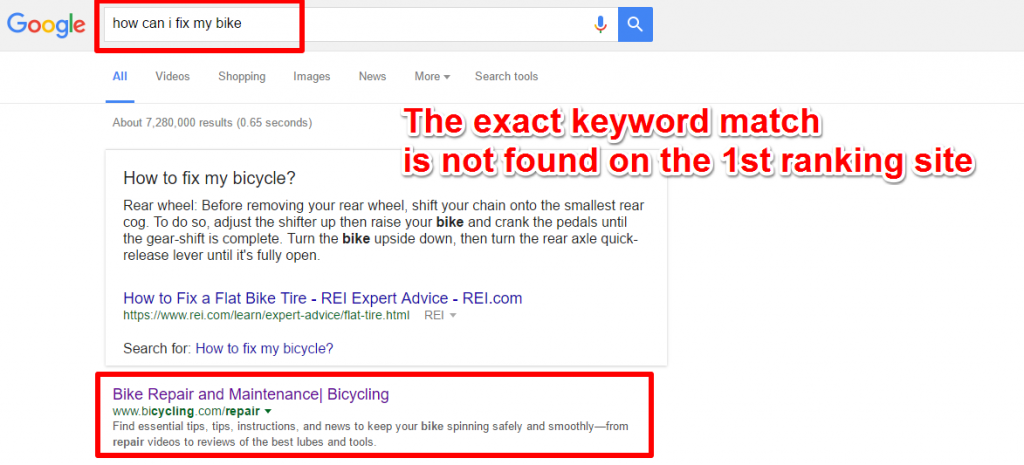
Indeed, you will say, but how come I get different result when searching for the same queries on desktop or on mobile? That’s correct; when searching through voice on your mobile and texting on your desktop you will get different results. And this happens for a bunch of reasons but all of them are highly connected to Google’s algorithm. It’s like being surprised that you are getting different results for “Halloween costumes” when searching with a US IP or a North Korean one. Google offers highly semantical, contextual results.
Even so, you might say, isn’t there anything you could do just to be sure that you are on the safe side even if the highly expected voice search revolution comes? Yes:
Optimize the best you can and the rest will follow; voice search included.
Make sure you are targeting the right keywords, make sure that you are mobile friendly, get local by registering your business.
What Voice “Search” Is Actually Used for
Google itself made a study revealing what voice search is most used for. And as we take a look at how voice search is used, we realize that people, both teens and adults, are using voice “search” mostly for taking several actions with their phone but not for searching the way we are used to. They use voice to interact with their phones rather than “googling” different queries.
From the same study we learn that more than half of teens (13-18) and 41% of adults use voice search daily. Probably most of them are relying on voice search for multitasking. However, at a closer look at the screenshot below we find out that voice “search” is most used to ask for directions. Therefore, navigation is the most used feature activated by voice. Certainly not “googling” for different queries, but more of “commanding” different actions.
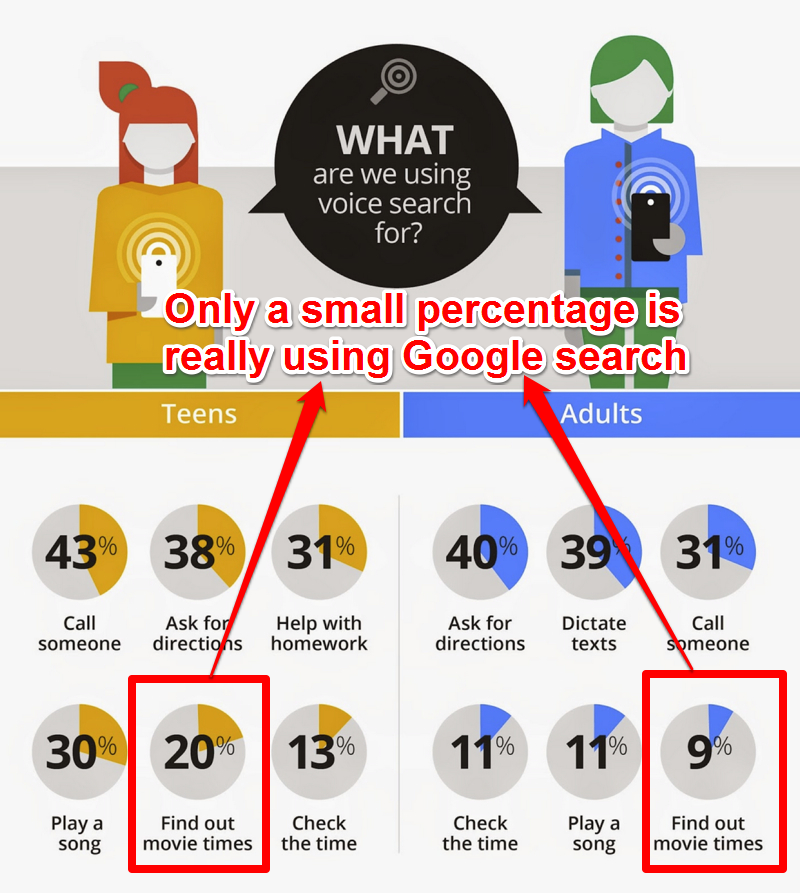
Once again, we cannot say that the search world is shaken to its foundations by voice search, as there isn’t much search to talk about.
Yet, in order to have a better idea on how or when the voice search is used, it might be helpful to look at the study from KPCB below. It seems like voice interaction is highly related with multitasking and not with some preference for voice search in itself.
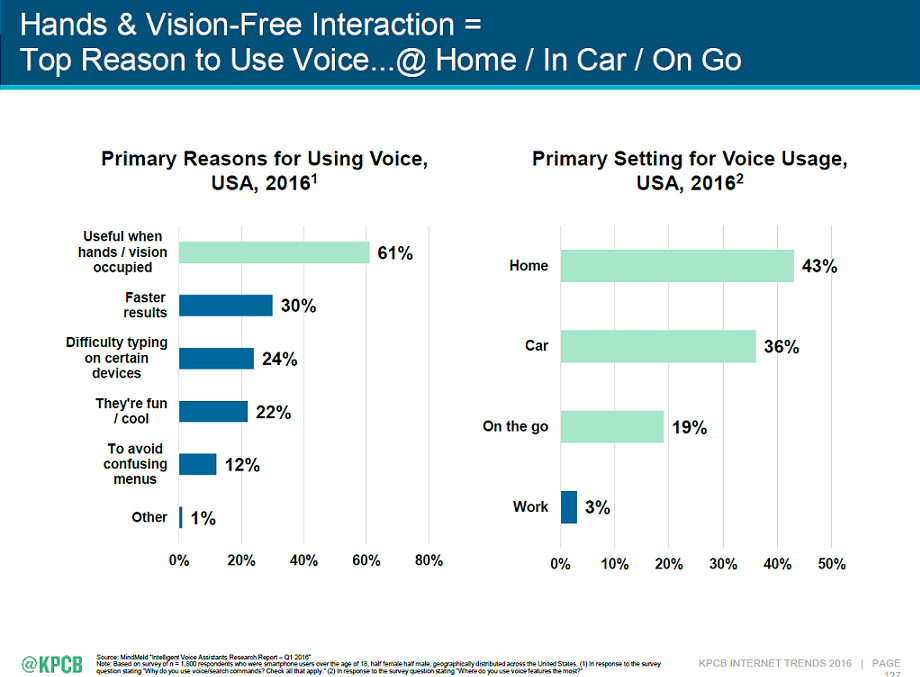
Voice Search Is NOT the Same with Voice Commands
Google Now (or the latest version, Google Assistant) implies several voice search & actions. That’s right, voice and ACTIONS. As we can see in the screenshot below, most of the examples you can work with using voice are concentrated around commands and not search. Except for the Facts & Quick Answers category which is concentrated as expected on search queries, the other categories are actions you can take with your phone: turn on Wi-Fi, play a song, set an alarm, call a friend. Not to mention that some of these actions work fine without any Internet connection.
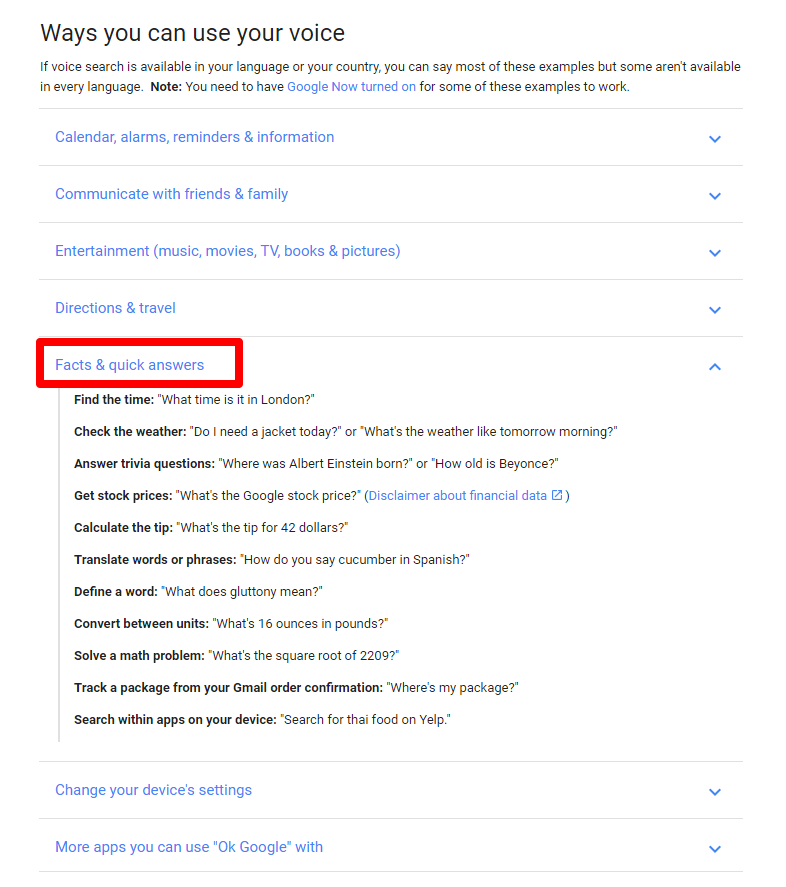
We are not saying that this actions are not cool and useful, we’re just saying that, when we’re talking about the future of voice search and how it will impact SEO we need to have a clear image of what we’re talking about.
Furthermore, the terms Voice Search and Voice Command are often confused with Voice over IP technology which only brings more unknowns into this equation. But, what does VoIP stand for? Essentially, Voice over IP is a group of technologies designed for the delivery of voice communication and multimedia sessions over Internet Protocol (IP). Recent stats show that, in the period between 2010 and 2018, the number of businesses using the VoIP business lines jumped from 6.2 million to 41.6 million. That means the relationship between SEO and VoIP should be closely examined.
Keeping that in mind we have to observe that although this form of communication uses the internet as its channel, VoIP affects SEO only in the most rudimentary NAP (Name, Address, Phone Number) consistency sense. Essentially, as long as your VoIP number is consistent across all locations (Yellow Pages, Twitter, Facebook, etc.), your rankings won’t be affected.
In terms of call tracking, things aren’t that different. As long as you are using any modern call tracking solution (e.g. call tracking for numbers that made the call through Google Ads), your SEO results won’t be affected. So, for the time being, we can put this issue aside. In what manner will VoIP affect SEO in the future? We will have to wait and see.
Who Are the Main Players in Voice Search?
Now that we’ve figured out how search engines’ main users interact with Google, Bing and Baidu, and before concluding weather voice search is really becoming a can’t-live-without feature, let’s see who are the main players in this field.
We know that there many egos involved when it comes to talking about operating systems and therefore voice search devices or apps. Our intention is neither to make a top of the main players from voice search, neither to make unfounded value judgments for any of them.
As they are so used and popular, they all have the merit of pushing technology barriers further by using cutting edge engineering.
As Andrew Ng, scientist at Baidu said, no one wants to wait 10 seconds for a response.
Accuracy, followed by latency, are the two key metrics for a production speech system.
Right now, we want to focus on the larger picture of voice search as a phenomenon and its impact on the SEO market as a whole.
Let’s take a look at some of the main players in the voice search field:
Siri – uses Bing search engine
The Speech Interpretation and Recognition Interface, usually referred to as Siri, is Apple’s voice assistant that’s available on most Apple products. Beside its abilities of calculating tips or understanding different accents it does answer to a bunch of useful questions and connects to Apple TV, iPhone and Apple’s CarPlay software. What Siri doesn’t do (and we don’t know whether it is a plus or a minus; we’ll let you decide) is pulling out info from your email.
Cortana – uses Bing search engine
Cortana, Microsoft’s virtual assistant, is built not only to understand voice queries but also their context. This means that it can manage its users’ daily life just as a human personal assistant would..or at least as accurately as possible. Cortana launched when Microsoft was looking to capture more in the mobile space. Not sure if they managed to win on that, yet, they did created a voice search app you can play “rock paper scissors” with and which will also remind you to fill up your car just when you’re near the the gas station.
Google Now, Google Assistant & Google Home- use Google search engine
Let us explain why there are two players in the same category: Google Assistant is an evolution of Google Now. Google Assistant, just like Google Now, can answer questions, check weather, etc. Yet, Google Now, it can engage in a two-way conversation, using Google’s natural language processing algorithm. What Google, and therefore its assistant does as well, is delivering personalized voice results based on your history and preferences. Some of you might find it science fiction, some of you might find it a bit creepy, but Google Now can, for instance send you traffic updates before even starting to commute to work. But no, it will not complete your work tasks. Already tried that.
Google Home is a new device on the market, a voice-activated speaker powered by the Google Assistant. Ask it questions. Tell it to do things. Pretty much like your own domestic Google, a gadget that that competes on the market with our next player in the field, Amazon Echo.
Amazon Echo – uses Bing search engine
Amazon Echo is fundamentally different from all the other devices presented in this category. Echo is designed to work exclusively with voice. All the other devices voice systems can be found on devices that have voice capabilities but not exclusively. Also, while all the others are working on portable devices as well, Amazon Echo (as well as Google Home) is made to be homebound and it doesn’t even have an interface; the voice is basically the only computing interface.
Deep Speech 2 – uses Baidu search engine
If you’ve already heard about this engineering jewelry, you’ve probably been already amazed by China’s leading Internet-search company, Baidu, which has developed Deep Speech, a system that can recognize English and Mandarin speech better than people, in some cases. Yet, mainly, why is Deep Search so cool? Because while older voice-recognition systems include many handcrafted components to aid audio processing and transcription, Deep Speech 2 system learned to recognize words from scratch, simply by listening to thousands of hours of transcribed audio. Pretty amazing, right?
Conclusion
The voice search field is clearly developing and is becoming a competitive niche. There is no doubt about this. But what about the area of “voice search SEO”? When placing voice search in the context of search and SEO we need to think thorough all the implications. Despite all the obituaries made for it, SEO is not dead. And it probably won’t be as long as search won’t be dead. The question that comes to everyone’s mind “do we have to forget everything we know and start learning voice search optimization” might be a bit hasty. As we’ve tried to show during this article, SEO is still necessary but for the moment there is no substantial difference between voice search optimization and text search optimization. The best advice that one can give in this situations is: Optimize the best you can, and the rest will follow; voice search included. Of course, there are some specific actions that you can do to have your website “voice search friendly”: targeting the right keywords, be mobile friendly or get local with your business. But then again, this are actions that you’ve already taken or you are going to, without having in mind the voice search revolution but the evolution of search in general.

 Site Explorer
Site Explorer Keyword tool
Keyword tool Google Algorithm Changes
Google Algorithm Changes

Never thought before about voice search as an important part of the process. But now it seems to be worth to pay attention on. Thanks for sharing and for useful statistics!
Alexis,
Glad you found the article useful 🙂
Amazing post. Recently I was creating an info-graphic on this topic for our SEO trainees, and this post and the information shared here are going to be gold mine for me. With more advanced and smaller interactive and internet enabled devices, in near future people will start using voice searches more than typing the queries. All webmasters must have the right strategies to optimize the content and other elements for voice searches specifically.
Really glad you found it useful, Poulami!Hope it helped you out with your info-graphic
Nice coverage of the topic. It answered all my questions. I feel there will be a time in he future where we’ll need to adapt for different types of tech involved in searches, but I can’t see what it is just yet. And as you pointed out, as long as you’re putting your best foot forward now for SEO, you should be covered.
Indeed, Michael! We can only stay prepared for whatever the future might bring.
I truly love this article for the direct yet supportive guide on Voice search. Voice search is indeed gaining mass acceptance which is clear from the fact that there’s an increase in questions being displayed in Google SERPs. Today no strategy is complete without optimizing for questions under People Also Ask. Secondly, a bonus of optimizing for questions will mean that you are likely to increase your chances of getting a featured snippet as well as be optimized for voice search.